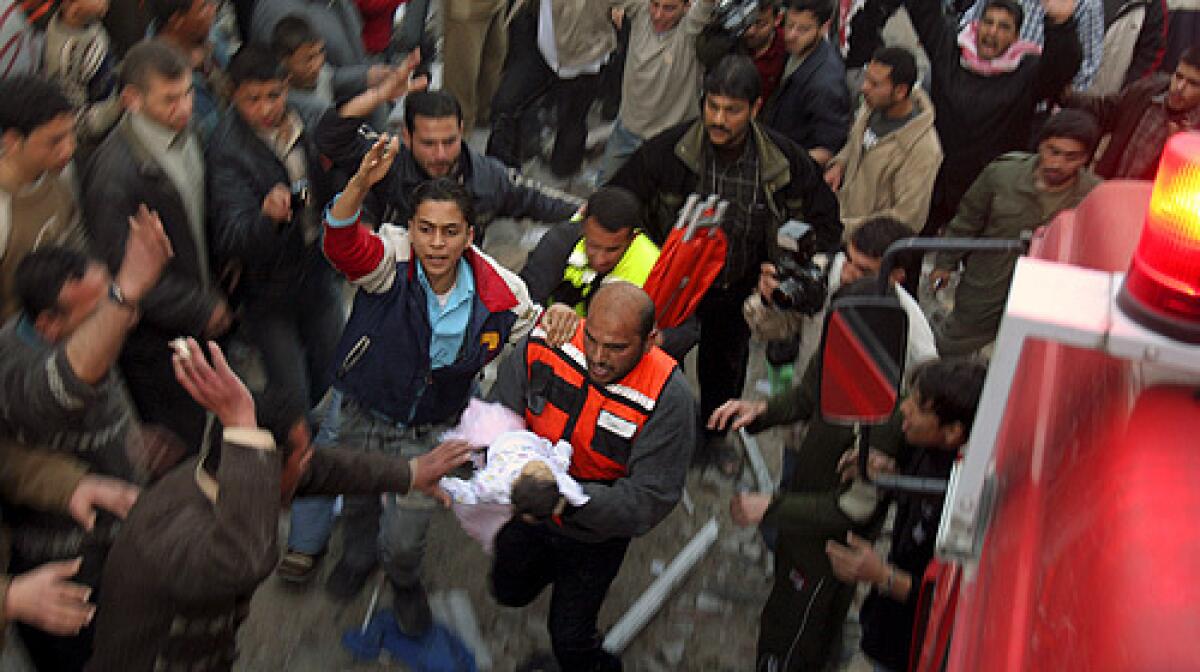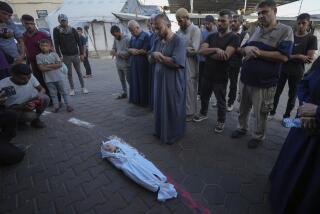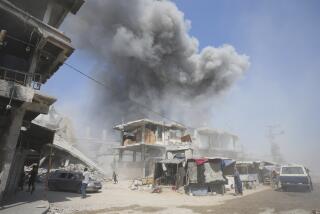Israel launches offensive into Gaza

JERUSALEM — Israeli forces Saturday made their deepest and deadliest incursion into the Gaza Strip in years, attacking Palestinian rocket-launching squads with tanks and warplanes but also inflicting a heavy loss of civilian life in the densely populated enclave.
Fifty-five Palestinians, 26 of them civilians, and two Israeli soldiers were killed as fighting raged into the night around militant strongholds in two urban centers of northern Gaza, according to Israeli military officials and Palestinian medical workers.
Trapped inside by the fighting, some Palestinians were killed when Israeli fire tore through their homes, witnesses said. But at least one civilian, a child, may have been killed by a Palestinian rocket that fell short of its target and into her home, spraying shrapnel, according to neighbors.
Palestinian hospital officials said it was the bloodiest day of fighting in Gaza since 2000 and put the death toll since violence escalated Wednesday at 85. They listed 150 Palestinians as having been wounded Saturday.
The violence in Gaza, a coastal territory of 1.5 million people ruled by the Islamist Hamas movement, prompted a threat by the rival, Fatah-led Palestinian Authority based in the West Bank to suspend peace talks with Israel.
Palestinian Authority President Mahmoud Abbas condemned the Israeli assault as “state terrorism” and called on the U.N. Security Council to press Israel to end it. Militant leaders and commentators across the Arab world referred to the bloodshed as a “holocaust.”
U.N. Secretary-General Ban Ki-moon, later addressing an emergency session of the council in New York, criticized Israel for using “excessive” force and called on the Jewish state to cease the attacks. He also condemned Palestinian rocket attacks into Israel.
Israeli government spokesman David Baker said Hamas and other militant groups bore responsibility for the civilian deaths. “They hide behind their own civilians, using them as human shields, while actively targeting Israeli population centers,” he said.
Israel is “compelled to take these defensive measures” to protect 200,000 Israelis living within Palestinian rocket range, he said.
Many unarmed Gazans said they felt as though they were intentional targets of the Israeli raids.
“Houses have been hit by tank shells and gunfire from the Israeli army,” Rami Mohammed Ali, a 21-year-old man huddled in an interior hallway with the rest of his family in Jabaliya, told Reuters news agency. “As a civilian, I wonder if Israel is really after rockets or is just punishing the population in general.”
Israeli leaders have been debating for weeks whether to launch a large-scale ground operation to try to halt the near-daily rain of homemade Kassam rockets from Gaza. Saturday’s incursion appeared to be a short-term action with the limited aim of pushing the rocket squads back from the border.
Still, it was one of the largest and deepest Israeli incursions in Gaza since the Jewish state unilaterally withdrew its military bases and settlements from the territory in 2005.
Hundreds of Israeli armored and infantry soldiers crossed into northern Gaza before dawn Saturday, advanced several miles on militant strongholds in Beit Hanoun and Jabaliya, and dug in for what was expected to be several days of fighting.
They targeted sites they said were rocket factories and bunkers manned by launch crews. An airstrike destroyed a truck carrying 160 rockets, the army said.
After dark, Israeli warplanes killed seven members of the Hamas-led police force in southern Gaza, two in a car in Khan Yunis and five in a mosque being used at night as a police barracks in Rafah.
Three missiles fired from the air early today destroyed the Gaza City building housing Hamas leader Ismail Haniyeh’s offices, which were vacant at the time.
The militants nonetheless kept up a steady barrage of rocket and mortar attacks through the day, aiming both at the soldiers and communities in Israel. Twenty projectiles landed in Israel, wounding six people.
Israel reported seven soldiers injured in addition to the two killed. They were the first army casualties since Israel intensified an aerial campaign Wednesday and Hamas replied with a rocket blitz that killed a middle-aged student on a college campus in Sderot, southern Israel.
Kassam rockets are wildly inaccurate, but militants have fired thousands of them from Gaza over the last seven years, killing 13 people and terrorizing Israeli communities a few miles away.
Since Thursday, the militants have raised the threat level by firing more than a dozen longer-range, Soviet-designed Grad missiles into the slightly more distant city of Ashkelon, 10 miles from Gaza. Israel says the rockets were probably made in Iran and smuggled into Gaza from Egypt.
Israeli Prime Minister Ehud Olmert has come under growing public pressure to step up action. But he is reluctant to order a full-scale ground operation in Gaza, in part because stopping the rocket fire would require reoccupying most of the strip and risking a prolonged period of bloodshed.
Also, with U.S. Secretary of State Condoleezza Rice scheduled to visit Israel this week, a major escalation is unlikely for now.
Instead, the Israeli army is expected to limit the operation to several days, said Alon Ben-David, military affairs commentator for Israel’s Channel 10 television.
“The army knows it will not bring the Palestinians to surrender nor succeed in stopping the Kassams altogether,” he said. “But it is trying to push them back so as to reduce the range of fire and to keep them occupied defending themselves rather than targeting Israeli territory.
“Today’s images from Gaza are images of war,” he added, “but this is not war yet, not really.”
That may be coming soon, however. Israeli Defense Minister Ehud Barak has been signaling to Western officials that some kind of major ground and air operation is being planned for warmer weather, when the skies over Gaza clear.
If so, Saturday’s fighting gave several indications of what is in store.
Hamas’ armed wing showed it was prepared for a major incursion. The group said it fired armor-piercing missiles and 44 mortar shells at Israeli forces in Jabaliya on Saturday. One person said he saw an Israeli soldier, whose body had been sliced in half, being pulled from a tank.
The other Israeli soldier died in an exchange of gunfire, one of many instances in which militants engaged the army in direct combat.
Militant groups said they lost 29 fighters.
Civilians were caught in the middle, and several died in their homes.
They included Samah Asaliea, 16, and her 21-year-old sister, Sanaa, who died in their kitchen in Jabaliya after an Israeli missile strike, medical workers said. Television footage showed their father, Ziad, weeping and asking God for revenge.
Ashraf Kafarna said an Israeli missile struck a home in Beit Hanoun, killing his 4-year-old cousin, Malak Kafarna, and wounding two of her siblings. But neighbors said the missile appeared to have been fired by Palestinians.
Tarek Dardouna, a resident of Jabaliya, said ambulances coming to pick up the wounded in his neighborhood retreated under gunfire. Hospital officials said the condition of 35 wounded people was critical enough to require treatment outside Gaza, but they were unable to leave because of Israeli and Egyptian border restrictions.
Moaiya Hassanain, a Palestinian Health Ministry official in Gaza, said 35 ambulances were unusable because of an Israeli economic blockade that has left Gaza short of fuel.
Hamas officials closed schools in Gaza and declared three days of mourning. The group’s armed wing issued a defiant message to Israel: “You will never stop the rockets.”
Rice is expected to arrive in Israel on Tuesday with an Egyptian proposal for a cease-fire in Gaza, an Israeli-Palestinian prisoner exchange and a reopening of the Egypt-Gaza border under European Union monitoring. Israeli officials are skeptical of a cease-fire, which they fear would allow Hamas to continue stockpiling weapons through tunnels under the Egyptian border.
Rice will have an additional challenge: rescuing the peace talks begun in December between Israel and the West Bank-based Palestinian Authority. They are aimed at reaching agreement on the birth of an independent Palestinian state by the end of President Bush’s term.
Israeli Foreign Ministry spokesman Arye Mekel said it was perfectly consistent for Israel to “fight terror that hurts its people” while negotiating peace with moderate Palestinian leaders.
But Ahmed Korei, the chief Palestinian negotiator, said Israel was committing a “massacre” in Gaza and making it impossible for Abbas to continue peace talks.
Special correspondent Rushdi abu Alouf in Gaza City contributed to this report.
More to Read
Sign up for Essential California
The most important California stories and recommendations in your inbox every morning.
You may occasionally receive promotional content from the Los Angeles Times.










